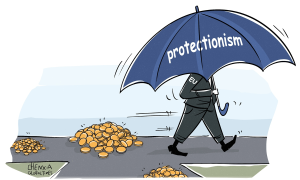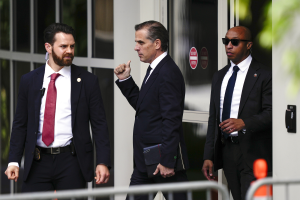As the U.S. deficit increases, politicians in Washington are unlikely to make a serious effort to get spending under control, experts said.

The Congressional Budget Office (CBO) on Tuesday said the national debt will hit 56 trillion U.S. dollars by 2034 amid increasing spending. That means debt held by the public would amount to 122 percent of gross domestic product by 2034.
UNSUSTAINABLE PATH
Some economists believe the U.S. budget deficit is on a path that cannot be sustained in the long run.
While this will not come overnight, economists fret over the future consequences of record spending.
“There can be no question that the U.S. budget deficit is on an unsustainable path,” Desmond Lachman, a senior fellow at the American Enterprise Institute and a former official at the International Monetary Fund, told Xinhua.
The “dangerous trajectory” poses “serious questions for the dollar” and inflation’s long-run outlook, Lachman said.
At some point, foreigners might be unwilling to finance the U.S. government if they perceive no real willingness to bring the country’s public finances under control, Lachman said.
“That could lead to a dollar crisis and it could also require the Federal Reserve to print money to finance the government. That would be a sure recipe for a renewed surge in inflation,” Lachman said.
Barry Bosworth, economist and senior fellow at the Brookings Institution, told Xinhua: “The deficit projections are evidence of a broken budget system.”
“While it is not an immediate crisis, it will become more constraining in future years,” Bosworth said.
The growing public debt will slowly crowd out private investment and increase foreign finance and control of the domestic economy, Bosworth said.
“It is, however, a very gradual process. A rising share of public spending will be devoted to debt payments, squeezing other public programs. The situation will worsen as an unhappy public pushes for further tax cuts,” Bosworth said.
WASHINGTON NOT SERIOUS ABOUT BUDGET REFORM
Experts have indicated that lawmakers in Washington have shown minimal interest in reducing spending or implementing meaningful budget reform.
Dean Baker, a senior economist at the Center for Economic and Policy Research, told Xinhua: “There is zero support for cuts in any major areas.”
Lachman said while Republicans like to cut taxes but do not want to cut public spending, Democrats like to increase public spending but do not want to raise taxes.
The net result is that the country keeps running budget deficits that are putting the public debt on an unsustainable path, Lachman said.
Bosworth said: “There is no plan to stabilize the budget situation in the future.”
Brookings Institution Senior Fellow Darrell West pointed out that the deficit was significantly increased by former U.S. President Donald Trump’s 2017 tax cuts, and there are intentions to extend those cuts next year.
Current U.S. President Joe Biden has proposed ways to decrease the deficit, but his pandemic spending of the last few years raised it as well, West said.
“Neither candidate is likely to do much in the next few years to reduce the deficit,” West told Xinhua, speaking of the two men running for president in November.
Clay Ramsay, a researcher at the Center for International and Security Studies at the University of Maryland, told Xinhua the government has three levers to do something about the deficit.
The government has the option to increase tax collection, which the Joe Biden administration has allocated Internal Revenue Service resources for. However, there is opposition from Republicans regarding this approach.
The government could change tax laws so more revenue is collected. This primarily means that the wealthy and upper middle class would pay more. The Democrats have some willingness to tax the first group but not the second, Ramsay said. Republicans have no willingness to tax either group, Ramsay added.
The third would be to spend less. “This is the hardest because it involves setting priorities, which is what the two parties most disagree about.”

